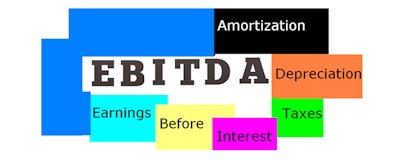
EBITDA, a GAAP financial measure, is a key component in the valuation of your business. The reason is simple: EBITDA is used as a proxy for operating cash flow. However, often overlooked in the sale of a business are the adjustments you can make to your earnings, a.k.a. Adjusted EBITDA (a Non-GAAP financial measure) that can have a significant impact on business valuation.
For example, today’s typical valuation multiple is 7X EBITDA, so a company booking $3,000,000 in EBITDA would sell for $21,000,000. But let’s say you found $300,000 to credit to your Adjusted EBITDA. That would boost the business value by $2.1 million dollars. So, it’s worth taking a good long look as possible credits.
Keep in mind that credits are typically one-time expenses that happen during your fiscal year (or calendar financial accounting year) that won’t repeat in the future or after the sale of your business. As a rule, buyers will closely scrutinize each adjustment to EBITDA, so credits must be legitimate and agreed upon with the buyer. (A word of caution: Don’t nickel and dime the adjustments. Adjustments to EBITDA of less than $1,000 should probably not be considered; they are often calls “ash and trash.”)
To determine what adjustments are typical, consult with your investment banker on what constitutes an adjustment to EBITDA, but here are some typical examples:
Owner salaries and bonuses: As an owner, if your salary and bonus is $300,000 per year, but the market rate to replace you is $200,000, you can most likely take a legitimate $100,000 adjustment to EBITDA. (The economic value of a $100,000 adjustment is a $700,000 increase in company value!)
Rent of the facilities: If the rent you are charging your business is below fair market value, the difference could be a positive adjustment to EBITDA. If the rent is above fair market value, that would be a negative adjustment to EBITDA, in favor of the buyer.
Personal owner expenses that are run through the business: For private businesses, it’s common (though not recommended by the IRS) for some owner’s personal expenses are run through the business, e.g. a family member that is on the payroll, or club memberships, or sports tickets that the acquirer would not pay post-acquisition. Those are likely EBITDA credits.
Non-recurring professional fee: Legal fees or a settlement of a lawsuit that are one-time events; consulting fees that are one-time expenses; one-time marketing expenses that are attached to a specific marketing program that will not repeat. All of these are valid credits to EBITDA.
Infrastructure, equipment, software, IT upgrade investments: The key to recognizing these credit rests in whether the investment was expensed or capitalized, as opposed to a one-time expense. If it was expensed and is one-time expense, it may be eligible as an adjustment to EBITDA. If it was capitalized, then it is not eligible since it is on a depreciation schedule, which flows through your income statement. Keep in mind you are already getting credit for your depreciation since EBITDA is earning before interest, taxes, depreciation, and amortization. So, one-time expenses, if they are being amortized, would not qualify as an adjustment to EBITDA.
Other one-time expenses: A note of caution: If your one-time expenses have recurred on your income statements in prior years and are projected to show up in the future years, they are simply not one-time expenses that can be used as adjustments to EBITDA.
Legitimate expenses vs. non-legitimate one-time expense that can be used as an adjustment to EBITDA can be readily determined in discussion with your investment banker and your accountant. Be sure to have that discussion, so you don’t leave money on the table. Adjustments to EBITDA are common, and it is an opportunity to increase the value of your business, sometimes dramatically. But it needs to be done carefully with one thought in mind: Will the buyer accept the adjustment to EBITDA as legitimate and fair?
 John D. Wagner, Managing Director at 1st West Mergers and Acquisitions
John D. Wagner, Managing Director at 1st West Mergers and AcquisitionsJohn Wagner is a managing director at 1St West Mergers and Acquisitions, which offers a specialty practice in the industrial distribution and software sectors. Learn more: www.1StWestMA.com. Contact John Wagner: [email protected]; 919-798-9984























